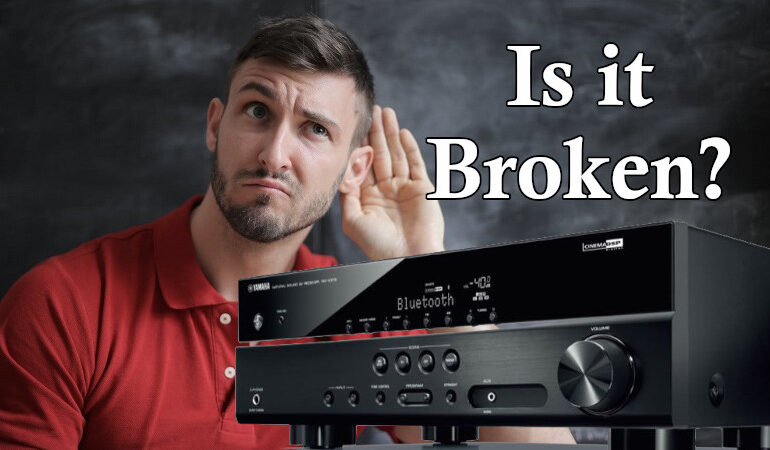My Receiver Sounds Quiet – Is It Dying?
We don’t always notice changes to our system at first. Sometimes, things happen gradually until we finally realize that something is different. We might not notice that our system sounds different but we would notice that the volume number ends up changing over time. What’s going on? Is your receiver sounding quieter mean that it is dying? Or is something else going on? Let’s discuss!
A Receiver Won’t Sound “Quieter” When It Dies
Generally speaking, a receiver won’t sound “quieter” when it starts to die. They’ll usually lose some functionality (certain inputs won’t work) or amplifier channels. Lowering volume isn’t a symptom of a failing receiver. So if lower volume isn’t a sign of your receiver dying, what could be going on?
First Eliminate the Obvious Answer
For many years I complained about my low-light vision getting worse. If you had asked me, I’d say I had perfect vision but I just needed a little more light than I used to when I was young. I quick trip to my optometrist taught me the truth. It wasn’t the amount of light, it was that my vision had gotten worse. Now I wear glasses and I can see just as well in low light as in a well-lit room.

If you feel that your receiver is getting “quieter,” it msy not be that your receiver is dying at all. Instead, you might finally be noticing hearing loss. Make sure you eliminate that as a possible cause before you start trying to fix your system.
Source, Apps, and Media are Different
Again, before you start shopping for a new AV receiver, let’s do a bit of a reality check. There are lots of ways you can get your content. You can stream from multiple different services, on many different devices, using many different apps. In my system, for example, I have two different game systems plus a streaming box that all have access to all the major streaming sources. If I stream Netflix (for example) from any one of these devices requires different volume levels when compared to the others. There is no standardization of volume output between different apps on different devices.

If you have recently switched which device you use to stream a service, you shouldn’t be worried that your receiver is somehow dying if the audio sounds quieter (or louder for that matter). Even though discs are supposed to be mixed to reference level, there is no guarantee you’ll prefer a single volume level even when you are using your disc player.
Did You Make Any Physical Changes?
Room acoustics are rarely considered when people are using their home theater systems. People often want to blame their gear or the size of their speakers. If you’ve made ANY changes to your room, it can affect your sound significantly. Want examples? How about:
- Moving your speakers or subwoofer
- Changing the furniture where your center speaker lives
- Getting a new couch
- Adding bookshelf
- Leaving the door to your room open
- Adding a rug
Obviously, moving your speakers or subwoofers can make a difference. However, any changes to your room can affect how you experience the sound in your room. The one that might not occur to you is leaving your door open. If your bass is suddenly anemic, it could be that you’ve changed the volume of air in your space by leaving the door open. By changing the acoustics of your room, you’ve changed how the sound waves interact with the space. This can be compounded by one thing:

Your Room Correction Could Be Making Things Worse
If you’ve changed your room in any way, you should re-run your room correction program. Your receiver could seem like it is dying because it sounds quieter, but it could just be your room correction. When you initially ran your room correction, it was attempting to give you the best sound for your current room. By making changes to your room, the EQ applied by the room correction could be negatively affecting your sound quality. Re-running your room correction will ensure that your EQ will take into account the new room layout.
Take Away
A receiver sounding quieter is rarely because it is dying. Is it possible that one of your amplifier channels is somehow failing slowly? Sure. It’s not unheard of. But it is rare. Instead, it is probably a sign of something else in your system (or your head) changing. Have you had this experience? What caused the change? Let us know in the comments!


